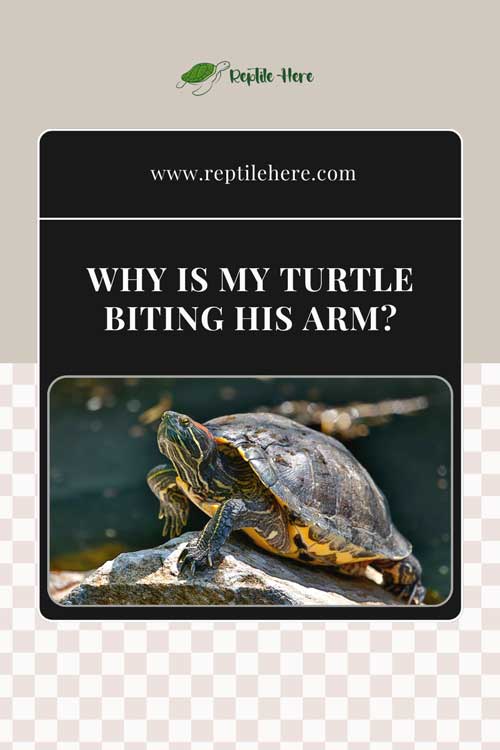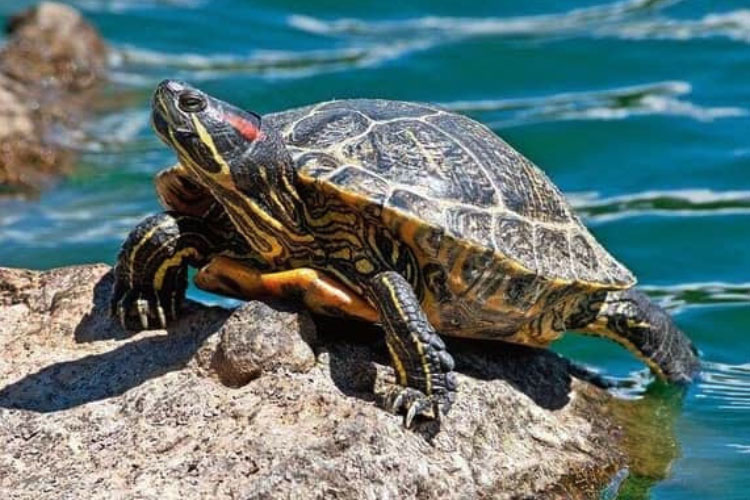Why Is My Turtle Biting His Arm? Should I Be Worried?
If you have caught your turtle attacking its own arm, you may wonder why this strange behavior. Could they be ill and should you be worried? What makes a turtle bite his own arm or shoulder?
Your turtle biting his arm happens when it is shedding its skin to rid of the loose skin or the itchiness resulting from skin peeling. Other reasons why a turtle may bite its own limb is due to irritation of its skin due to dirty tank water or if something gets stuck under its scales.
Read the following guide for more information on why your turtle shows this strange behavior of biting its arm, whether these bites can harm them, and how you can help your turtle if it’s biting its arm.
Why is my turtle biting his arm?
Contents
If you caught your turtle biting its arm for the first time, you may get easily worried as to whether it’s ill. However, this unusual behavior is a common occurrence in turtles and many experienced turtle owners have witnessed it severally.
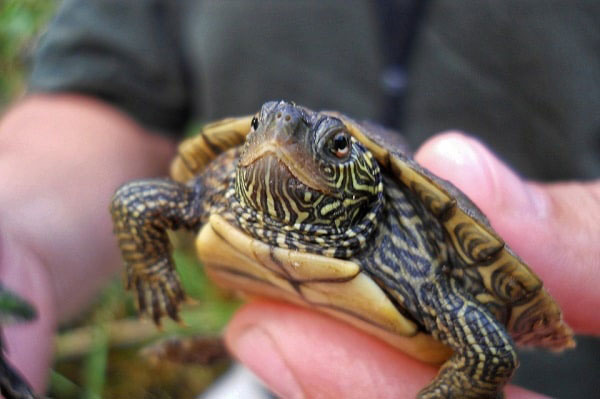
The most common reasons for a turtle to bits its arms are listed below:
Shedding of skin
The MOST common reason why a turtle bites its arm is when it is shedding skin. The shedding process can be itchy, forcing the animal to bite its body. Biting also helps your turtle remove loose skin and helps with the shedding process.
Irritation/itchiness
It could also be that your turtle is feeling skin irritation around the arms, forcing it to bite it for comfort. Skin irritation in your pet turtle can be due to poor water conditions. If you haven’t changed the water for a while, it may be contaminated with high levels of ammonia and nitrites and make the turtle’s skin irritated and itchy.
Attack by mites
A turtle under attack by mites will also feel uneasy and use its mouth to bite its arms. if you inspect your turtle closely and see mites on its body, then you have found the culprit behind your pet biting its own limb! Not just mites, an attack by fungus can also make your turtle’s arm itchy and force it to bite itself.
Look if something is stuck under the scales
If something becomes stuck under your turtle’s scales, then it may also display this behavior of biting itself. Again, you’ll need to inspect your turtle closely for any stuck objects and get rid of them carefully (tweezers will come in handy in this case).
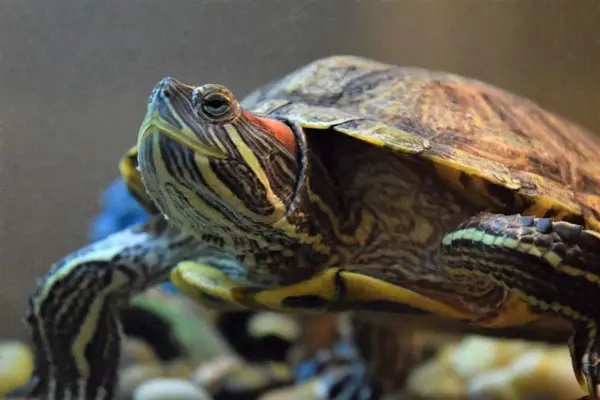
Poor UV lighting
Turtles require proper UV lighting for the absorption of UVA and UVB rays. Lack of proper UV lighting can affect their health and lead to skin rashes. The rashes will then irritate your pet and it will have to use its teeth to remove the rashes on its limbs.
Boredom or stress
Boredom and frustration can also force your turtle to start doing crazy things like biting its arm. This is especially true if you haven’t enriched its environment with various items to make keep your turtle happy.
After spending long hours exploring its tank enclosure, it will get bored of it and even become frustrated with its limited enclosure/space. This may force it to start biting its arms due to stress.
How do I stop my turtle from biting his arm?
If you catch your pet turtle biting its arm, you’d want to find out the reason behind this behavior. This will give you a clue on how to go about stopping this habit.
As you have seen above, there are multiple reasons why your turtle may bite its arm, so there’s no single procedure to solve this.
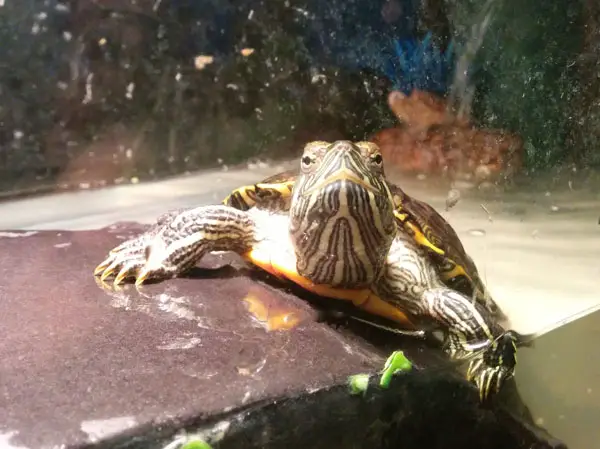
Follow these tips to keep your turtle from biting its arm:
Ensure a comfortable environment for your pet
You should start by providing a comfortable environment for your pet turtle so it doesn’t get bored. Ensure you provide them with a spacious tank space where they can freely move around, swim, and bask. Also, introduce fake plants, substrate, and turtles in the tank for your turtle to play with. You should ensure the tank temperature stays at comfortable levels. Adding live fish and other tank mates will also keep your turtle from getting bored.
Keep the turtle tank clean
As we have just seen above, dirty contaminated water can irritate your pet’s skin. it can also promote growth of fungus and algae and even attract diseases that aren’t healthy for your pet.
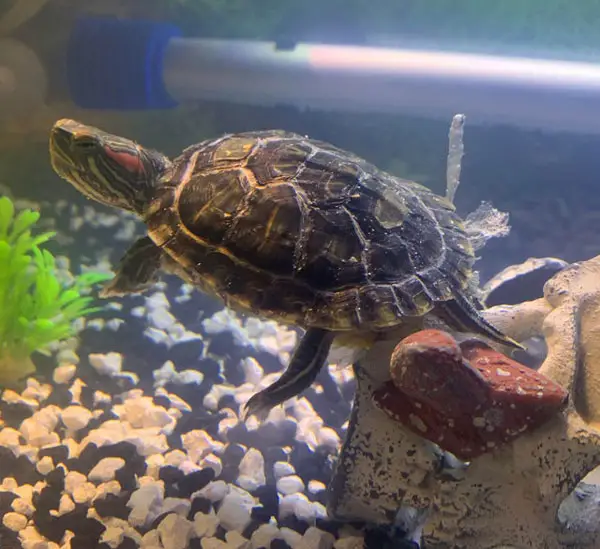
For this reason, you should make sure your turtle tank remains clean. Do a partial water change once per week to keep water parameters in check. Investing in a powerful filtration system will also help in keeping the tank clean.
Feed your turtle a proper diet
If you don’t feed your turtle a proper diet, its body will experience a deficiency of certain minerals and this can lead to its skin developing rashes. Lack of proper nutrition will also weaken your pet’s immune system, making it vulnerable to various skin diseases as well as attack by parasites.
Lack of vitamins during the peeling process also means the skin takes longer to be shed off. You should also stick to a feeding schedule to ensure your turtle doesn’t go hungry and start biting its arms or resort to eating gravel, sand, or peeling skin to satisfy its hunger.
Final Verdict
Turtles generally don’t bite their arms. If you catch your turtle doing this, then the most possible reason is that it’s shedding its skin which comes with itchiness or it just wants to remove the shed skin. It could also be due to poor water conditions irritating its skin, or the turtle is under attack by parasites such as fungus and mites and it is using its mouth to scratch its arms.
Preventive measures you can take to keep your turtle from biting its limbs include providing them with a comfortable living environment inside the tank, ensuring you feed them a proper diet, and keeping their tank clean at all times. If you implement these methods but your turtle doesn’t seem to stop biting its arm, then you may want to consult your vet for professional advice.
